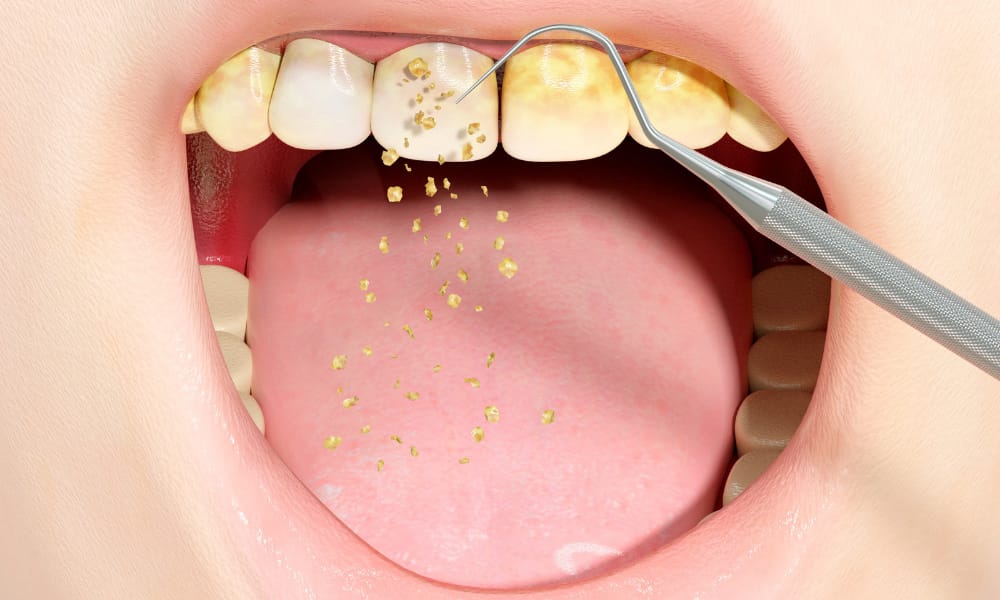
Dental plaque, a sticky and colorless film, readily forms on the teeth and gum line. It is composed of bacteria, food particles, and saliva. Regular and effective oral hygiene practices are vital to prevent its buildup.
What Causes Plaque Formation?
When we consume food, especially sugary foods and drinks, the bacteria in our mouth break them down into acids. These acids, combined with saliva and residual food particles, lead to the formation of plaque. Hence, maintaining a balanced diet and avoiding excessive sugar intake can help control plaque buildup.
The Impact of Plaque on Oral Health
If not promptly and thoroughly removed, plaque can harden into tartar, a substance more difficult to eliminate. It provides a conducive environment for bacteria to thrive, leading to cavities and gum disease. Over time, these conditions can escalate, resulting in tooth loss or other severe dental issues.
Recognizing Plaque and Tartar
Early detection of plaque and tartar is crucial for effective treatment. Plaque often feels like a fuzzy coating on your teeth, while tartar is a hard, crusty deposit that can be yellow or brown. Regular dental check-ups can help identify and address these problems.
Prevention and Treatment
Good oral hygiene habits are the best defense against plaque. This includes brushing twice a day, flossing daily, and using an antimicrobial mouthwash. Regular dental cleanings are also essential as they can remove tartar and hard-to-reach plaque.
The Importance of a Professional Dental Cleaning
A professional dental cleaning can deliver a level of clean that at-home oral care can’t. You can get relief from bad breathe easily with this treatment Dentists use specialized tools to remove tartar and plaque, even from the most hard-to-reach areas, ensuring a thorough clean that safeguards your oral health. Plaque is a common oral health issue that can lead to severe complications if left unattended. However, with good oral hygiene practices and regular dental cleanings, it is possible to keep plaque under control and enjoy a healthy, bright smile.
Exploring the Role of Diet in Plaque Control
Diet plays a pivotal role in dental health, significantly influencing plaque formation. Foods rich in sugars and carbohydrates contribute to plaque buildup as the bacteria present in the mouth break them down into acids. Over time, these acids, combined with your saliva, form the sticky film known as plaque. Consuming a balanced diet can help keep plaque at bay. Incorporate fresh fruits, vegetables, lean proteins, and whole grains into your diet and limit the intake of sugary snacks and beverages. Foods that naturally stimulate saliva production, such as cheese, pears, and sugar-free chewing gum, can also be beneficial.
The Connection Between Lifestyle Choices and Oral Health
Lifestyle choices can significantly impact your oral health. Habits such as smoking or excessive alcohol intake can lead to dental problems, including plaque and tartar buildup. Both smoking and heavy drinking alter the mouth’s normal function, making it more susceptible to bacteria, infections, and complications. It’s crucial to understand these impacts and consider lifestyle modifications to enhance oral health. Keeping plaque and tartar under control goes beyond the scope of regular brushing and flossing. It includes making mindful dietary choices and maintaining a lifestyle conducive to oral health.
The Impact of Stress on Oral Health
Notably, stress and anxiety can also contribute to dental health problems, including plaque buildup. Stress can lead to teeth grinding or clenching, dry mouth, and neglecting oral hygiene practices, all of which make the mouth more conducive to plaque and tartar formation. Moreover, stress might lead to unhealthy eating habits, such as increased consumption of sugary snacks or drinks, further exacerbating the problem. It is important to manage stress effectively, through methods such as regular exercise, meditation, or seeking professional help, to protect not only your mental health but also your dental health.
The Role of Age and Medications in Oral Health
Age is another factor that influences oral health. With age, our gums naturally recede, providing more area for plaque to form and harden into tartar. Certain medications can also impact oral health by causing dry mouth, a condition that favors plaque formation due to decreased saliva production. It’s crucial to stay hydrated and chew sugar-free gum to stimulate saliva production if you’re on such medications.
Conclusion
A comprehensive approach to dental health goes beyond just maintaining regular oral hygiene practices. It involves making conscious dietary choices, maintaining a healthy lifestyle, effectively managing stress, and being aware of the impact of aging and certain medications on oral health. Regular dental check-ups remain vital to detect any potential issues early and ensure optimal oral health.





More Stories
Biopsy Techniques In Melanoma Diagnosis: Beyond Traditional Methods
Make an informed decision to use the best CBD oil product as per guidelines
Get a Famous Immunity IV Therapy to Strengthen Your Immune System